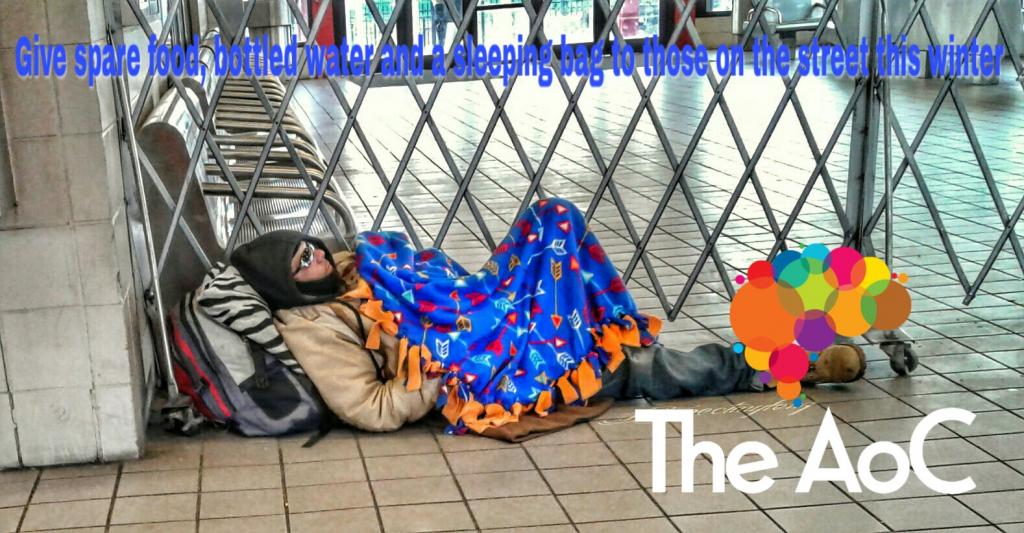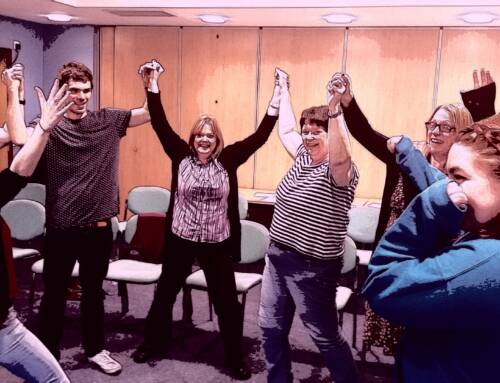Have you experienced being homeless or know someone who has? Do you want to know more about homelessness? Do you want to see what’s being done to tackle this?
Merry Christmas everyone (and to those who don’t celebrate it) and especially to those of us who are living without adequate shelter. This particular time of year can be just as difficult and perhaps even more lonely.
This blog from The Arts of Change or aka The AoC’s very own Bloggie Ben – will, hopefully, try to answer all those questions for you right here.
How and why do people become homeless?
In the UK, you may be classed as homeless if you’re sleeping rough, don’t have rights to stay where you are, or you live in unsuitable housing. The definition of homelessness means not having a home. You are homeless if you have nowhere to stay and are living on the streets, but you can also be classed as homeless even though you have a roof over your head. You can still be named as homeless if you are;
• Staying with friends or family
• Staying in a hostel, shelter or B&B
• Squatting (you have no legal right to stay)
• At risk of violence or abuse in your home
• Living in poor conditions that affect your health
• Living apart from your family because you don’t have a place to live together
Homelessness can affect anyone at some point in their life regardless of age, gender, religion and so on. It affects a wide variety of people, but some may be more vulnerable than others. If you are homeless you would be at more of a risk if;
• You’re leaving home for the first time or leaving care
• Pregnant with nowhere to stay when the baby arrives
• Struggling to live on benefits or low income
• You’re from abroad and have no rights to claim benefits
• You’re an asylum seeker or refugee
• You have just been released from prison
• You leave the army with no home to go to
• Your relationship breaks down
• You are experiencing mental health, emotional or psychological issues
There are many different reasons which result in people becoming homeless. There are social causes of homelessness such as lack of affordable housing, poverty and unemployment and other life events that cause individuals to become homeless. People also become homeless when they leave prison, care or the army with no homes to go to. Many homeless women have escaped from a violent and abusive relationship. A lot of people become homeless as they can no longer afford to pay rent. For many, life events such as losing a job, a relationship breaking down, mental or physical health problems or substance misuse can be a trigger. Becoming homeless would then make a lot of these problems even harder to overcome and resolve. Other reasons for becoming homeless may include;
• Being evicted by a landlord or landlady
• Being asked to leave from family, partner and/or friends homes
• Harassment by neighbours
• A disaster such as flooding or fire
Not everyone who becomes homeless is entitled to be housed. In England, local councils have a duty of care to find somewhere for a person to live if they have a ‘priority need’. This includes families with children, people in emergency after a flood or fire, or people that are “vulnerable” for various other reasons. In addition to those points, they must not have deliberately done or failed to do anything that may have caused them to become homeless.
If you have been involved in an abusive relationship whether it be physical or emotional or if you have an alcohol or drug problem which has put you at risk of being homeless, we can help. With our professional counselling team, we can provide personal, or one to one therapy, couple counselling or group therapy to help you overcome these problems. For more information please contact us on 01384 211 168 or email us – support@theaoc.org.uk
Alternatively, if you prefer to self-help, you can join our community forum: all proceeds go to helping those who cannot afford counselling or therapy support.
Facts & Statistics
• Around 59,000 households were accepted by councils as entitled to be housed in 2016/17. This number has been rising ever since 2009/10 and is up by almost 50% within that period.
• However, the above statistic is 56% below the level of 2003/04 when 135,000 households were accepted.
• There are around 20,000 cases in England alone that are homeless but not considered ‘priority need’ amounting to around 1 in 6 of all decisions.
• Around 9% of cases or 10,000 households are homeless and in need but are considered intentionally so.
People can be placed into temporary accommodation while their claim is being investigated or they are waiting for somewhere more suitable. Temporary accommodation can include B&Bs (bed and breakfast) hostels, council housing and private rentals.
• In England, 64% of households who accepted an offer of housing in the last 3 months of 2017 were given temporary accommodation. 86% of households in temporary accommodation on December 31st 2017 were placed in ‘self-contained accommodation’ such as council or private rentals. The rest were all in B&B or hostel style accommodation.
• 69% of English households in temporary accommodation were based in London
• At the end of 2017, 79,000 households were in temporary accommodation. This is 4% higher than the same time in the previous year. It has been increasing steadily since 2011 but is still under the peak in 2004 of 101,000.
• Around 1 in 14 households in temporary accommodation were in bed and breakfasts in the last 3 months of 2017.
• The government has been ‘concerned’ about the number of families and children being places in B&B’s since the early 2000’s.
• Since April 2004 the law has said that families with children should NOT be housed in B&B’s except in emergency circumstances and, even then, only for 6 weeks maximum.
• 2,030 families with children were in B&B’s in the last 3 months of 2017. This has been increasing since 2011 but below the peak of 7,000 in 2002.
People who are legally homeless are “rarely” on the streets, according to the Ministry of Housing, Communities and Local Government. There are no definitive statistics for how many people in the UK are sleeping rough, so the following statistics are estimates;
• Last year in 2017, around 4,800 were estimated to be sleeping rough in England alone. This is 15% higher than in 2016 and more than double the estimate of 1,800 for 2010.
The government started to ask local authorities to count rough sleepers in the 1990’s but the data before 2010 is not comparable with the more recent figures. Most of the local authorities did not provide any numbers in their older data provided, although the government still accepting this data. This meant that no comprehensive picture could be shared.
In 2005, the government stated that rough sleeping had fallen by 75% since 1998 and in 2010, said that rough sleeping was at an 11-year low. These estimates were based on a relatively small sample of local authorities, and they cannot be used to put an overall figure on the number of people that were sleeping rough in that period.
There is a much more detailed database kept for rough sleeping in London. CHAIN (Combined Homelessness and Information Network) records people found sleeping rough by outreach teams. It’s database is funded by the Mayor of London, and run by the charity St Mungo’s.
8,100 people were seen sleeping rough at some point in 2016/17, slightly more than the previous year. Quarterly reports are also available for different areas of London and can be seen here – https://data.london.gov.uk/dataset/chain-reports
A parliamentary committee investigating homelessness has recommended a system like CHAIN to be used in more areas of the UK so more accurate facts and figures can be provided.
In Scotland the local authorities have a duty to find accommodation for all people who are unintentionally homeless or threatened with homelessness. Over 28,000 people were assessed as homeless in 2016/17. This was, and staggeringly so, the lowest since their data began in 2002/03. In the six months to September 2017, around 15,000 were assessed as homeless.
Nearly 11,000 households were in temporary accommodation in September 2017. This is the highest at that time of year since 2011. 3,400 of these were families with children. An increase of 3% from the previous year.
Welsh local authorities, are required to prevent people from becoming homeless and provide all applicants accommodation for 56 days. After this period, they have to help secure accommodation for people who are unintentionally homeless and in priority need. In 2016/17, 9,200 people were given help to prevent them from becoming homeless, and nearly 11,000 were eligible for help to secure a home. There were just over 2,000 households in temporary accommodation in the third quarter of 2017. Nearly 900 of those were families with children.
Northern Ireland’s local authorities, like those in England are required to secure accommodation for people who are homeless or threatened with homelessness and in priority need. In 2016/17, around 10,000 people were accepted as homeless. That’s a 27% increase on the previous year.
All the above facts and figures were provided by – https://fullfact.org
What can we do to help?
The law is changing! The new law – The Homelessness Reduction Act 2017 came into force in April 2017. Amongst other things it put in new duties on local authorities in England to prevent and relieve homelessness for everyone, including people who don’t count as ‘priority need’. The government promised £73 million to local authorities to meet the new requirements. A new code of guidance for local authorities has been published too, and it can be seen here – https://fullfact.org/economy/homelessness-england/?gclid=EAIaIQobChMIts7SxN-m3wIV5b3tCh19bwGDEAAYAiAAEgJyefD_BwE
If you are at risk of being homeless, are homeless or have been threatened with homelessness within the next 8 weeks you can ask for help from your local council. Local councils have a legal duty to help some people. Not everyone gets help with housing, some people just get advice on how to find a home. Usually it’s the housing department that helps, but sometimes social services help instead.
This may happen if the housing department cannot assist, and there are children within the family or someone who is elderly or frail.
Some charities for the homeless may help young people, people who don’t have children and people with drug or alcohol problems. Some provide temporary emergency accommodation such as night-shelters or hostels. A local church or charity may also be able to help with basics like food and clothing. Practical help may be provided by day centres, community groups, charities and other privately funded organisations for homeless people in the form of food banks and soup kitchens.
It is also suggested to get advice as soon as possible if you have any worries about becoming homeless. A housing advisor will be able to help you to;
• Find a way to stay in your home
• Find a new home more quickly
• Get help from your local council
There are many charities you can also donate too. Shelter and The Salvation Army are currently taking donations to help those homeless over the bitter Christmas period. Donations can be of any amount but donations of £19:00 can potentially provide welcome packs for all which include toiletries and a mug for 4 homeless people in one of their residential centres. £45:00 can provide support and advice for 5 homeless people in one of their residential centres. A donation of £112:00 would meet the cost of three officers to run a Salvation Army centre for a day – this would keep the door open to all of the vulnerable.
There is also the opportunity to set up fundraising activities for any given homelessness charity of your choice, there are many to pick from such as Crisis or The Big Issue. You can liaise with the charity to arrange this and can-do activities such as football matches or sponsored runs to raise money and awareness.
If you see any homeless people alert the professionals. Many people who may be shopping or on the commute to work pass the homeless by not knowing how they can help. Telling a professional is one of the easiest ways to do so. Street Link is a government funded service which allows people to alert local authorities in England and Wales about rough sleepers in need of support in their area. You can contact Street Wise through their website here – https://www.streetlink.org.uk/
Many of the homeless on the streets are asking for money. Some people do give them their loose change, but others consider what the money will be spent on such as drugs or alcohol and choose not to give them anything. It is better to offer them food and a drink. It is also suggested that some just want a conversation and some company, so if you have 5 spare minutes do try talking to them to brighten up their day if only for a short while. Remember, anyone of us could at any point in our lives become vulnerable to being homeless, and for a wide range of reasons.
You can even give those who are homeless simple small things such as gloves, a hat or even a sleeping bag to get them through the cold winter days and nights. “A lot of people doing a little is better than a few people doing a lot.” – Founder of Sock&Chocs Ian Northcott. The charity is based in Birmingham UK and give out pairs of socks and chocolate to the homeless. Other gifts do make a difference also such as books and scarves. You can even purchase sleeping bags, thermal underwear, recyclable hand warmers and adhesive body warmer stick on strips; which can last for up to 12 hours.
A furry friend is sometimes the only companion a rough sleeper will have. Both owner and the pet will be very grateful of a kind gesture. You can buy some dog food for the pet as well as some food for the owner. There are charities around such as Hope Project via The Dogs Trust trying to help rough sleepers with pets in many ways, one of them being to convince hostels to accept those who are homeless that have pets. The project also helps by funding around 1,800 vet visits and treatments, meaning the dogs can stay with their owners.
You can also help the homeless through The AoC. We have an online forum known as https://www.theaocanxietyandstresssupportforum.org.uk where you can discuss online any problems or issues you or someone you know may have. You can share knowledge, support, ideas and much more. You may also receive access to professional advice and guidance from our team, and access appropriate support links, as well as the chance to share your views with others who are also being affected. This brilliant online community forum also offers a wide range of topics to discuss such as problems with gaming, anxiety, stress, depression and much more. There is a small annual membership fee of £5:95 and money raised goes toward offering free counselling sessions for individuals, couples or whole families in crisis, and op all age groups, and to those in need who cannot afford such a service, including those who are homeless or about to be. You can sign up to the forum and become a member by clicking the link provided above.
Bloggie Bens thoughts and experiences
Myself and my family, thankfully, have never been at threat of homelessness, so I can’t tell you how it feels or what it’s like. I can only imagine the difficulty this would be and stress. I work in Central Dudley, and each time I go into the town, there are at least 4-6 homeless people all sat within the doorways of empty buildings. I recall there are two males that were squashed into the same doorway, who were fast asleep in their sleeping bags but there were lots of people just strolling past, including myself, who could do nothing but look and carry on with their day. It makes me feel helpless that there isn’t that much I can do for them apart from hand them some food and a drink. I myself would not hand them money because I wouldn’t like to think they would spend it towards drugs or alcohol which isn’t going to help their situation at all. I’d much rather spend the money on something such as food or clothing to keep them warm because I know they will benefit from that sort of thing.
I often notice that a lot of people appearing to be living on the streets, also have a dog with the. I often wonder why this is. It makes me feel even worse that they’re homeless: as I’m a big dog lover and hate to think of them without a home or being vulnerable or hurt in any way. There used to be a man I regularly saw, and he always had a lovely Staffordshire Bull Terrier with him. You could see how much that dog meant to him, as it was his closest friend and only real companion. He would care for the dog more than himself by ensuring it always had food and was wrapped up before himself. One day, whilst walking through Dudley Town, I noticed that he was alone; the dog was not with him – which l thought very strange. The man was so upset, and it was easy to see something was wrong. At first, I feared the worst thinking the poor dog had passed away but thankfully that was not the case. He was speaking to another gentleman about the dog, who had been taken away from him by a stranger! I was so shocked and disgusted by this. I have no idea how someone could have the nerve to take his companion away; perhaps the only thing this poor man had left. There were said to be many witnesses to the dog being taken from him and thankfully the dog was found unharmed and safe and returned to the man. I was relieved. I can’t even imagine how the owner felt to be reunited with his beloved pet. Not long after, l saw the man once again, and back in his usual spot. It’s been a long time since I’ve seen the man and his dog now, and I hope they have found a warm home and are living there, together and happily.
I wish there was more we could do apart from donations and handouts, but the amount of people now on the streets and without a home is staggering. A lot of them are even hidden so it’s difficult to get accurate details of just how many people are without a home. Please do be kind enough to give them some clothing for the cold winter months, provide them and their pets a small bite to eat and just speak with them even if only for a couple of minutes, after all we’re all humans and like a little companionship.
Thank you all for reading, and for those who celebrate Christmas, have a lovely one.
Bloggie Ben.









